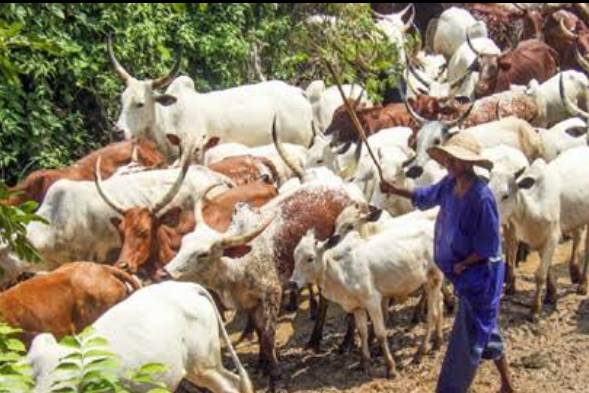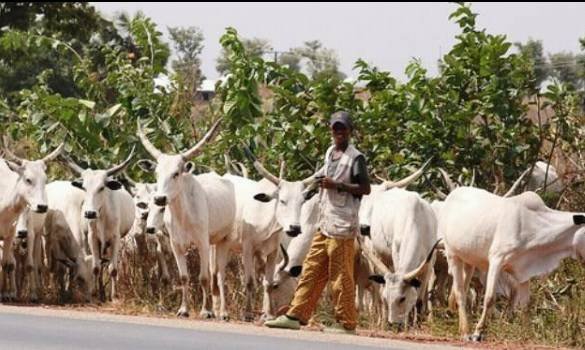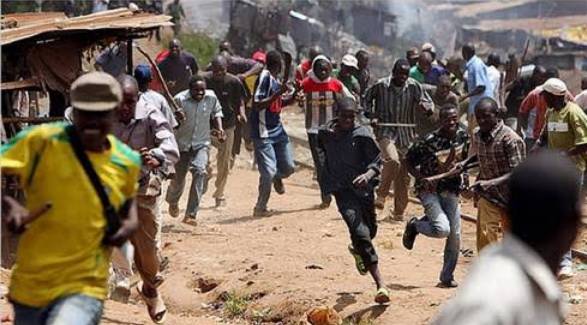A Peek Into "Nomadic Africa" - Fulani herdsmen

With the sun setting down the flatlands, fathers, husbands and sons each with a stick at hand, whistle hung around some necks, journeying back to their resting places -or perhaps home- with whitewashed (tainted with a little black and brown here and there) herd following closely, regurgitating on what was once in the recticulum, while driving away its unwanted visitors by means of its tail. Wives, mothers and daughters making preparations for food, others milking the cows, sourcing water and firewoods, while a few older women weave mats and baskets.
This is often the sight seen with the nomads, the nomads are people who move from one place to another in search of grasslands -food- for their animals. They often belong to communities or tribes, but move to a different location, and do not have a permanent place. The migration could be seasonal, following traditional route to a well defined territory with good pasturage. For numbers of years nomads have shepherded goats, sheep and cattle across good pastures and grasslands.
A common tribe in West Africa which practices nomadism as a way of life are the Fulani herdsmen (also referred to as the Fulbe ladde).
Although the Fulani herdsmen are infamous for their nefarious activities recently in some states in Nigeria such as Benue state, here are some interesting facts about them.

The Fulanis are one of the largest ethnic group in West Africa, widely dispersed across the region due to their nomadic lifestyle, found in countries such as Nigeria, Niger, Senegal, Guinea, Mauritania, Mali, Burkina Faso, Ghana, Benin, Côte d'ivoir and Cameron. Apart from that, they are the largest nomadic ethnic group in the world, the only migratory people group in West Africa and as a result of their constant wandering since from time past, (as earliest evidence that shed some light on the pre historic Fulani culture, depicts their early life dating back to the 6000BCE as cattle keeping farmers) the Fulanis are seen in every climatic zone and habitat of West Africa, from the deserts in the North to the derived Savannah and the forests of the South.
The Fulani pastoralist are either nomadic or semi-nomadic. The pure pastoralist engages in the random movement of cattle while the semi-nomadic makes transhumance migration and return back to their camps or homes.
These semi-nomads (also referred to as Fulbe wuro) were those who founded the Fulani towns, as they were nomads who simply chose to settle in a given area rather than continue on their way.
A nomadic Fulani family is the traditional herding unit and tasks are divided by gender and age among the family members. The main responsibility of men is to manage the herd, locate grazing site, build tents and camps, making security tools such as knives, bow and arrow. The women take on roles such as sourcing food produce in the market, milking cows, mat making and little farming like growing vegetables and raising poultry.
A typical house of the nomadic farmers is known as bukkaru meaning grass house, its s dome shaped house supported by compact millet stack pillars during the dry season and reed mats held together and tied against wood poles during rainy seasons. The grass house is easy to set and dismantle, also mobile thus encouraging the nomadic lifestyle.
Their are traditions and customs practiced by the Fulani herdsmen, one of which is HABBANAYA. This involves loaning a cow to another until she calves, once the calf is weaned it is retained and the cow is returned to the owner, this habbanaya is a prized gift and often a special ceremony is held in its honor, where it is given its name and it is never struck during its lifetime.

A custom also held is an annual festival known as DEWGAL, there is an annual cycle of transhumance migration where Fulani herders cross the Niger river to a Malian town of Diafarabe. During the rainy seasons,the river swells turning the town to and island thus filled with lush fields and good pasturage therefore providing lots of food supply for cattle but during drier season , the river dries and the cattle can return home.
Crossing the Niger river us much more than a search for pasture, its an avenue -a competitive one- which shows craftsmanship as an herder. The cattle are driven into the river and each herder with no assistance loudly encourages the animals to move forward. The panel of judges then decides whose cattle is the fattest. The herder is awarded best caretaker and the worst is awarded with a peanut signifying shame.
The Fulani herdsmen are religious people, they where the first group in West Africa to convert to Islam, actively supporting its theology and ideology which led to many jihads or holy wars some of which where major.
Apart from God, the Fulani herdsmen also worship there cows, its their major source of livelihood, existence and sustenance in the world, as a cow sells for an average range of 100-400 thousand naira.
The wealth of a Fulani herdsmen is counted by how large his herd of cattle is. The lifestyle of a Fulani herdsmen makes electricity, roads, modern houses, western infrastructure in general a waste and as such some have serious apathy towards them. As the major reason for their migratory life is to find areas with abundant grass and water for his livestock.
In this process, conflicts usually arise either between the Fulani herdsmen and sedentary farmers due to reprisal attack caused by destruction of crops, alleged theft and murder of cows and because the Fulanis view their cows as gods, they resort to violence as a means of defense and protection of life and property. Also conflict can occur between pastoralist due to competition for grazing routes.
What then can be done to curb these conflicts and the vices usually accompanied?!.
Although, it us their constitutional right to move freely into any part of the country, security agents (private and governmental) could do their utmost to prevent the attacks and counter attacks and also things that breed the violence.
Also the government could introduced livestock development plan and policies aimed at reducing the farmer-herder clashes, this could be development of grazing reserves and livestock route in all states, areas that are out of the towns and cities where residents won't be affected. Further, the cattle herders could be introduced to ranching and encouraged to embrace this in-house breeding of cattle.
Although, the nomadic way of life could be lost, lives of humankind could be saved.
Authored by @motivatorjoshua
The lifestyle of most fulani people are so different, all they care about is just their cow and it seems its their only source of income.
Glad you shared.
Nice photo